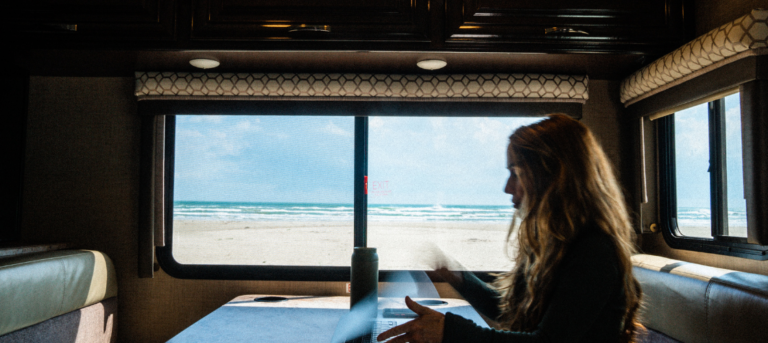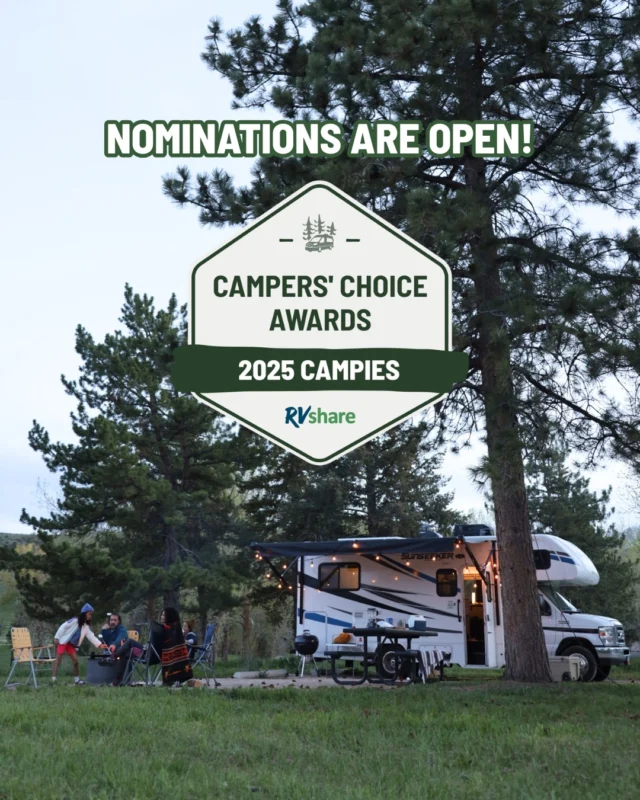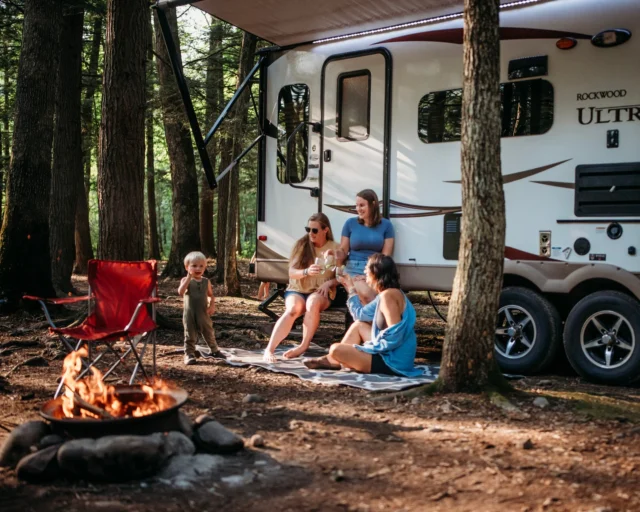
There once was a time when living in a motorhome or trailer and traveling full-time was just a pipe dream that the vast majority of us could never obtain. However, with the birth of the internet and the plethora of online jobs that came after, it is now more possible than ever to hit the road and never come back.
In this article, we will discuss our best tips for those looking into living in a travel trailer or motorhome. Read on to learn where to begin and what to consider.
Earning Income While RVing Full Time
Unless you’re retired or independently wealthy, you will need to find some way to make money on the road. As mentioned before, the internet makes this possible for many by making remote work available in a variety of fields.
There is also the option of “work camping,” which allows you to work in a campground in exchange for a site and small income. Additionally, some people will turn to seasonal work, staying full-time in one area and/or campground for months at a time before moving on.
Try the following resources to find a mobile job that works for you:
Budgeting for RV Living
The thing many people worry about most when considering this lifestyle is RV living cost. While it may not necessarily save you money to live and travel in an RV full-time, it actually does not need to be as expensive as you might imagine.
Below are the budget line items you’ll want to include when creating your budget for full time RV living:
RV/Truck Payment
Obviously you will want to budget for your RV payment (if you didn’t pay cash for your rig), along with any vehicle payments you may have. If you need to lower month-to-month expenses, consider paying cash for an older RV and/or vehicle in order to avoid making payments.
RV/Truck Insurance
It’s important that you carry good insurance on your RV and vehicles. In the case of the RV, make sure you have full timers insurance, as this will cover things that typical RV insurance does not and will ensure you’re taken care of in case of an accident. Insurance is not the place to cut costs in your RV budget.
Roadside Assistance
Roadside assistance is super important to have before you hit the road. This will save you should you find yourself broken down on the side of the road. Make sure you choose an RV-specific roadside assistance plan!
Medical Insurance
Since you won’t have a typical office job while working on the road, it’s likely that you also won’t have the medical insurance offered as a perk by lots of traditional jobs. In this case, you will need to find another way to ensure you are covered. We recommend using the Health Insurance Marketplace for this.
Campground Fees
It probably goes without saying that you will also need a place to park your RV, which means paying camping fees. This is definitely something you will want to budget for, but it is important to note that camping fees can vary widely based on where you are, the type of campgrounds you prefer, and how long you’ll be staying.
To save on camping fees, stay in each campground for at least a month, try boondocking some of the time, and/or invest in camping memberships.
Some of our favorite camping memberships for full timers include:
Phone and Internet Costs
You will need to keep your cell phone on for use while traveling. Additionally, you’ll likely want to have a way to stay connected to the internet. We will discuss this more in-depth below, but know that you will need to set aside as much as $150 or even $200 a month for internet while traveling.
Fuel Expenses
RVs are fuel guzzlers, meaning you will likely see an increase in the amount you are spending at the pump. On top of that, some RV appliances use propane, meaning there is yet another type of fuel you have to purchase. How much your fuel bill increases will depend on how far and how often you are traveling, as well as how much propane you are using.
You can save on gas and diesel by using apps like GasBuddy and joining Good Sam Club for discounts at certain gas stations. You can save on propane by using electric appliances when parked in campgrounds where electricity is included.
RV and Vehicle Maintenance
RVs really aren’t built to last. This means the maintenance and repairs these tiny homes require can often seem endless. Add regular vehicle maintenance on top of that, and you can be looking at several thousand dollars a year in vehicle and RV fixes. Be sure to set money aside for these things!
Sightseeing Expenses
There’s no point in traveling if you don’t get out and see things. This means you also have to budget for sightseeing. Luckily, sightseeing doesn’t have to be super expensive.
Cut back on sightseeing expenses by buying reciprocal memberships:
- ASTC gives you free access to science centers.
- NARM gives you free access to art, history, and niche museums.
- ACM gives you half-off admission at children’s museums.
- AZA gives you free or discounted admission to zoos and aquariums.
- America the Beautiful gives you free admission to national parks.
- Merlin Pass gives you free access to Merlin-owned attractions across the USA, including LEGOLAND.
- Six Flags Plus pass gives you access to all Six Flags parks in the country.
- Cedar Fair All Park Passport gives you access to all Cedar Fair parks in the country.
You can also reduce expenses by seeking out free attractions and choosing outdoor activities that don’t require admission fees, like hiking and paddling.
Roadschooling Expenses
If you’re traveling with kids, depending on how you decide to roadschool—and we’ll cover this further in a bit—you may also want to budget for homeschool-related expenses. While there are plenty of free homeschool curriculum options out there, many can cost hundreds of dollars each year.
Other Logistics of RVing Full Time
Budgeting isn’t the only thing you have to consider as you prepare to RV full time. Here are a few other logistics you’ll want to straighten out before you hit the road.
Establishing a Domicile
If you aren’t keeping your sticks-and-bricks home, you will need to establish residency somewhere. To do this, we recommend using one of the many mail forwarding services available to RVers to create a “home” address, and making the state in which the mail forwarding service is located your domicile state.
Most RVers choose one of the following states to domicile in:
- South Dakota
- Florida
- Texas
Receiving Mail
Another benefit of using a mail forwarding service? It allows you to receive mail while you travel. All mail will be sent to the forwarding service, which can then send the mail on to you wherever you might be whenever you request it.
Seeking Out Medical Care
You will of course need to be able to get medical care while RVing full time as well. The best way to do this is to choose a primary care doctor that is covered by your insurance in the state you choose as your domicile. Make a point of returning to that area a few times a year for routine care.
If you need health care in between your regular checkups, you can use a combination of telehealth services, urgent care centers, and emergency rooms.
Internet on the Road
Above, we talked briefly about staying connected to the internet while traveling. You have a couple of options for doing this.
One option is to have a mobile hotspot that connects to cell towers. For more reliable coverage, you can have two or three hotspots, all connected to different carriers. It also helps to invest in a cell booster.
Another option is to stay connected through satellite internet. Currently, the best satellite internet option is Starlink. We like that Starlink can connect even in the most remote places. It does cost a pretty penny to set up, however.
Roadschooling the Kids
We discussed roadschooling above as well, but we didn’t really talk about what that is or what it entails. Essentially, roadschooling is homeschooling your kids while traveling in an RV.
This can be done in a variety of different ways. Some people choose to attend public school online; others use a traditional textbook curriculum or a set of workbooks; and still others choose to take a more relaxed approach, allowing the kid to choose what they learn and when.
Be sure to read up on the various types of homeschooling and the enormous number of homeschool curriculums out there so you know how you’d like to roadschool before you hit the road.
Creating Community
Believe it or not, full time RVers do have community. In fact, traveling communities are some of the closest communities out there. Make sure to join some travel clubs before you get on the road, and plan to attend some rallies and events as soon as you head out in order to make connections and start building your road family.
As you can see, there is a lot to consider when jumping into full time RV living. Fortunately, once you get started, taking the steps needed to start traveling full time is actually not as difficult as it may seem. Why not get started today?






